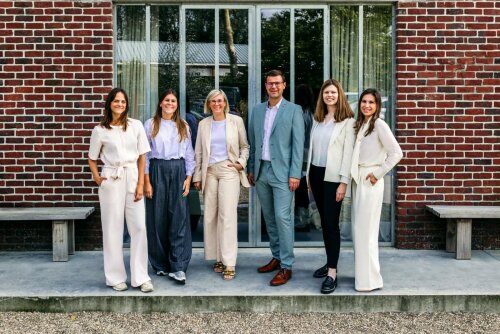Best Biotechnology Lawyers in Belgium
Share your needs with us, get contacted by law firms.
Free. Takes 2 min.
Or refine your search by selecting a city:
List of the best lawyers in Belgium
About Biotechnology Law in Belgium:
Biotechnology in Belgium is a rapidly growing industry that involves the use of living organisms or their derivatives to develop products and services. This field encompasses various sectors such as pharmaceuticals, agriculture, food production, and environmental management. The legal framework governing biotechnology in Belgium is complex and constantly evolving to keep pace with technological advancements.
Why You May Need a Lawyer:
There are several situations where individuals or companies involved in biotechnology may require legal assistance. These can include intellectual property issues, regulatory compliance, licensing agreements, contract disputes, and litigation. A lawyer with expertise in biotechnology law can provide valuable guidance and representation to navigate these challenges effectively.
Local Laws Overview:
In Belgium, biotechnology is regulated by a combination of national laws, European Union directives, and international treaties. Key aspects of local laws that are particularly relevant to biotechnology include patent protection, data privacy, research ethics, and product safety regulations. It is essential to stay informed about the legal requirements and compliance standards to avoid potential legal pitfalls.
Frequently Asked Questions:
1. What is the procedure for obtaining a biotechnology patent in Belgium?
Belgium follows the European Patent Convention for biotechnology patents. The process involves filing an application with the European Patent Office and meeting the requirements for patentability.
2. Are there any specific regulations for genetically modified organisms (GMOs) in Belgium?
Yes, Belgium has strict regulations for the cultivation, import, and release of GMOs to protect public health and the environment.
3. How can I protect my biotechnology inventions from infringement?
You can protect your inventions by securing patents, trademarks, copyrights, and trade secrets. Consulting a lawyer can help you develop a comprehensive intellectual property strategy.
4. What are the ethical considerations in biotechnology research in Belgium?
Researchers must follow ethical guidelines and obtain informed consent when conducting experiments involving human subjects or sensitive data.
5. Can I license my biotechnology innovations to other parties?
Yes, you can license your innovations to third parties through licensing agreements that define the terms and conditions of use, royalties, and intellectual property rights.
6. What are the potential liabilities for biotechnology companies in Belgium?
Biotechnology companies may face liabilities related to product safety, environmental impact, data breaches, and compliance violations. It is crucial to assess and mitigate risks to avoid legal consequences.
7. How can I resolve a dispute with a business partner in the biotechnology industry?
You can resolve disputes through negotiation, mediation, arbitration, or litigation. A lawyer can assist you in exploring the best course of action based on your specific circumstances.
8. What are the rules for exporting biotechnology products from Belgium to other countries?
Exporting biotechnology products may require compliance with international trade agreements, export controls, import regulations, and product certifications. It is essential to conduct due diligence and seek legal advice to ensure compliance.
9. How does data privacy law impact biotechnology companies in Belgium?
Biotechnology companies must comply with data privacy laws such as the General Data Protection Regulation (GDPR) when collecting, processing, and storing personal data. Non-compliance can result in significant fines and reputational damage.
10. What resources are available for biotechnology entrepreneurs in Belgium?
There are various resources available for biotechnology entrepreneurs, including research centers, incubators, government grants, industry associations, and legal advisors specializing in biotechnology law. Networking and collaboration can also help entrepreneurs navigate the challenges of the industry.
Additional Resources:
For more information on biotechnology laws and regulations in Belgium, you can consult the Belgian Federal Public Service Health, Food Chain Safety, and Environment, the Belgian Biosafety Server, and the Belgian Intellectual Property Office. Legal organizations such as the Belgian Biotechnology Law Association and the Belgian Association of Intellectual Property Lawyers can also provide valuable insights and support.
Next Steps:
If you require legal assistance in the field of biotechnology in Belgium, it is advisable to consult a specialized lawyer with expertise in biotechnology law. The lawyer can assess your specific needs, provide tailored advice, and represent your interests in legal matters. Be proactive in addressing legal issues to protect your rights and ensure compliance with the law.
Lawzana helps you find the best lawyers and law firms in Belgium through a curated and pre-screened list of qualified legal professionals. Our platform offers rankings and detailed profiles of attorneys and law firms, allowing you to compare based on practice areas, including Biotechnology, experience, and client feedback.
Each profile includes a description of the firm's areas of practice, client reviews, team members and partners, year of establishment, spoken languages, office locations, contact information, social media presence, and any published articles or resources. Most firms on our platform speak English and are experienced in both local and international legal matters.
Get a quote from top-rated law firms in Belgium — quickly, securely, and without unnecessary hassle.
Disclaimer:
The information provided on this page is for general informational purposes only and does not constitute legal advice. While we strive to ensure the accuracy and relevance of the content, legal information may change over time, and interpretations of the law can vary. You should always consult with a qualified legal professional for advice specific to your situation.
We disclaim all liability for actions taken or not taken based on the content of this page. If you believe any information is incorrect or outdated, please contact us, and we will review and update it where appropriate.
Browse biotechnology law firms by city in Belgium
Refine your search by selecting a city.












